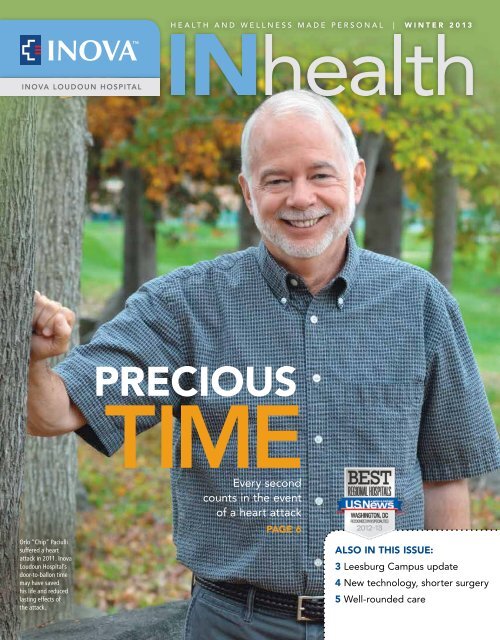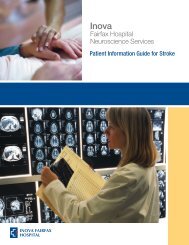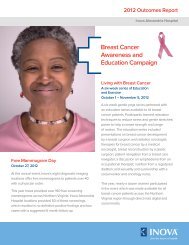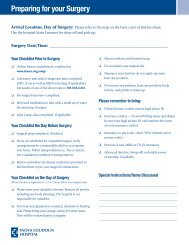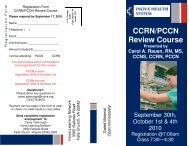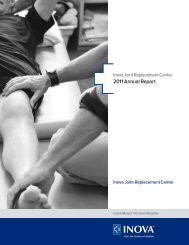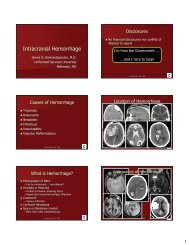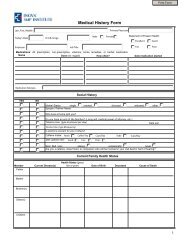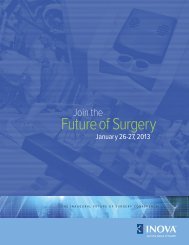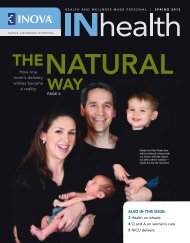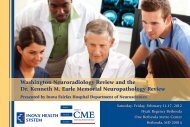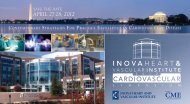Create successful ePaper yourself
Turn your PDF publications into a flip-book with our unique Google optimized e-Paper software.
HEALTH AND WELLNESS Made Personal | WINTER 2013<br />
INOVA LOUDOUN HOSPITAL<br />
precious<br />
TIME<br />
Orlo “Chip” Paciulli<br />
suffered a heart<br />
attack in 2011. <strong>Inova</strong><br />
Loudoun Hospital’s<br />
door-to-ballon time<br />
may have saved<br />
his life and reduced<br />
lasting effects of<br />
the attack.<br />
Every second<br />
counts in the event<br />
of a heart attack<br />
PAGE 6<br />
ALSO IN THIS ISSUE:<br />
3 Leesburg Campus update<br />
4 New technology, shorter surgery<br />
5 Well-rounded care
{<br />
FOLLOW<br />
}<br />
THE LEADER<br />
INthenews<br />
For up-to-the minute information<br />
about <strong>Inova</strong>, visit<br />
inovanewsroom.org.<br />
Happy 2013!<br />
The New Year is a time of<br />
renewal and reinvigoration. At<br />
<strong>Inova</strong> Loudoun Hospital, that<br />
means renewing our commitment<br />
to providing exceptional<br />
care for patients and families<br />
through our service promise:<br />
“We seek every opportunity to<br />
meet the unique needs of each<br />
person we are privileged to<br />
serve — every time, every<br />
touch.” Each and every day we<br />
strive to provide personalized<br />
care that meets our patients’<br />
individual needs. We feel honored<br />
that our patients choose<br />
our organization for their healthcare,<br />
and it is our privilege to<br />
provide that care.<br />
2013 will see continued<br />
growth at <strong>Inova</strong> Loudoun<br />
Hospital. We will implement a<br />
new comprehensive electronic<br />
information system, improving<br />
clinical care and communications<br />
with our caregivers and<br />
patients. We will complete the<br />
first phase of the revitalization<br />
of our healthcare campus in<br />
downtown Leesburg, offering<br />
state-of-the-art emergency services,<br />
expanded diagnostic<br />
imaging, new outpatient service<br />
capabilities and a new behavioral<br />
health unit. We will also<br />
complete our master facility<br />
plans that will guide our facility<br />
development for the next<br />
decade.<br />
We want to thank each of you<br />
for all you do for us and wish<br />
you a year of renewal and,<br />
above all, good health.<br />
PATRICK<br />
WALTERS<br />
CEO, <strong>Inova</strong><br />
Loudoun<br />
Hospital<br />
Diabetes Center Grows<br />
New, bigger location allows team to serve more patients<br />
At the beginning of January, <strong>Inova</strong> Diabetes<br />
Center-Loudoun will open its doors at a new<br />
location, 211 Gibson St., in Leesburg. This<br />
new space, which features a large classroom, a<br />
private workroom and five private offices, will<br />
allow the Diabetes Center team to better serve<br />
existing — and future — patients.<br />
“The square footage [in the new location]<br />
is so much bigger, so we are able to<br />
offer more services to more people,” says<br />
Traci Carter, <strong>Inova</strong> Diabetes Center Manager.<br />
“These new private office spaces allow<br />
for more private appointments with more<br />
advanced technologies, such as Continuous<br />
Glucose Monitoring (CGM),” she says.<br />
Glucose Monitoring Technology<br />
Thanks to CGM, diabetes patients can stay<br />
end knee pain<br />
MAKOplasty offers minimally<br />
invasive surgical approach<br />
Help is available for people with early- to mid-stage osteoarthritis<br />
of the knee — and it is a less invasive option than total knee<br />
replacement. MAKOplasty ® is a robotic procedure that enables<br />
surgeons to precisely target the diseased portion of the knee<br />
without compromising the healthy bone and tissue surrounding it.<br />
There are many benefits. Because it’s a minimally invasive<br />
procedure done on an outpatient basis, MAKOplasty ® patients<br />
are back on their feet quicker than patients who have had<br />
traditional knee replacement surgery, walking with crutches<br />
within hours and back at work within one week. Most patients<br />
return home within 24 hours of surgery, as opposed to a two-tothree-day<br />
hospital stay after traditional knee replacement surgery.<br />
A regionally recognized leader, <strong>Inova</strong> Loudoun Hospital<br />
ranked as a U.S. News & World Report Best Hospital in six<br />
adult specialties including orthopedics, and is one of few<br />
hospitals in the area that have made the investment to<br />
offer this new surgical approach.<br />
on top of their blood sugar levels. A probe<br />
with a tiny sensor is inserted just under the<br />
skin, and stays there for a period of about<br />
five days, sending glucose readings every<br />
five minutes to a “beeper-like” device worn<br />
by the patient. Most major medical insurers<br />
cover CGM for type 1 diabetes and for<br />
some cases of type 2, according to Carter.<br />
For patients who are unsure if CGM is<br />
right for them, the Diabetes Center has an<br />
initial trial period for patients to see what<br />
the technology is like. “They can borrow<br />
one of our CGMs for a week,” Carter<br />
says. “What’s more is that we don’t have<br />
a fee for borrowing one of our CGMs;<br />
there’s just a starter fee for the probe.”<br />
<strong>Inova</strong> Diabetes Center–Loudoun also<br />
offers diabetes education, which is a covered<br />
Help Available<br />
Learn more about the MAKOplasty<br />
resurfacing procedure<br />
at inova.org/ilh-mako.<br />
2 | WINTER 2013 | <strong>Inova</strong> Loudoun Hospital
coming soon!<br />
Leesburg renovation to be completed in spring<br />
benefit under Medicare and most major insurers, to<br />
help people self-manage diabetes. Classes include a<br />
type 2 diabetes basics class and a gestational diabetes<br />
class. Looking forward, the Center hopes to expand its<br />
services to include insulin pumps, too, Carter says.<br />
Patients will soon be able to take advantage of new facilities at <strong>Inova</strong><br />
<strong>Health</strong>Plex in Leesburg. The first stage of the campus renovation is scheduled<br />
for completion this May.<br />
“We have gutted this building to the structure and floor slabs,” notes<br />
Project Manager Mike Bergeron. “We are even replacing the roof, so it<br />
will essentially be a new building.”<br />
The first phase of the $32 million project will include a larger,<br />
13,000-square-foot Emergency Department, which will have a new<br />
trauma unit, radiology suite and lab; outpatient rooms; enhanced imaging<br />
services, including two CT scanners; a new brick-and-glass façade;<br />
and upgraded security systems and central plant services.<br />
The second phase of the renovation project should be finished in October.<br />
This will include moving the 22-bed Loudoun Adult Medical Psychiatric<br />
Services (LAMPS) from the older buildings to the renovated area.<br />
The Future Is Here<br />
The latest in robotic technology offers shorter<br />
hospital stays and faster recovery<br />
Among the traditional surgical options for gynecologic conditions, robotic<br />
surgery is the latest minimally invasive approach. Robotic surgery allows<br />
surgeons to carry out complex and delicate procedures through tiny incisions.<br />
This can result in dramatic patient benefits, including less blood loss, less<br />
postoperative pain, shorter hospital stays and faster overall recovery.<br />
<strong>Inova</strong> Loudoun Hospital welcomed the latest version of the robotic surgical<br />
system, the da Vinci ® Si, on Nov. 12. This latest version of the da Vinci ® has<br />
enhanced high-definition 3-D vision and includes a<br />
broad range of instrument types that are available<br />
to help the surgeon perform specialized surgical<br />
tasks with precision and control.<br />
Ruchi Garg, MD, gynecologic oncologist<br />
at <strong>Inova</strong> Loudoun Hospital, utilizes the most<br />
advanced techniques to treat endometrial<br />
and cervical cancer, as well as for<br />
patients who have undergone multiple<br />
surgeries that have led to difficulties<br />
in completing laparoscopic surgeries.<br />
Ask the<br />
Expert<br />
Prevention and Treatment<br />
of Gynecologic Conditions<br />
Ruchi Garg, MD<br />
Obstetrician/<br />
Gynecologist<br />
Join Ruchi Garg, MD, for a FREE lecture about the<br />
prevention and treatment of gynecologic conditions,<br />
including cancers. The lecture will take<br />
place on Monday, April 1, at 6:30 p.m. at <strong>Inova</strong><br />
Loudoun Hospital, Conference Rooms A and B.<br />
Call 1.855.My.<strong>Inova</strong> (1.855.694.6682) or<br />
visit inova.org/AskTheExpert to register<br />
for the FREE program.<br />
inova.org/ilh | 3
Simplifying<br />
Surgery<br />
Imaging technology minimizes<br />
time spent during breast surgery<br />
The process of performing a lumpectomy at <strong>Inova</strong> Loudoun<br />
Hospital has become streamlined. Until last year, when a<br />
breast surgeon performed a lumpectomy at <strong>Inova</strong> Loudoun<br />
Hospital, he or she sent the extracted specimen to the radiology<br />
department for confirmation that the target area within the<br />
breast had been removed. The tissue then needed to be returned<br />
to the operating room, where it was delivered to the pathology<br />
department. Now, thanks to Faxitron imaging technology,<br />
not all of these time-consuming actions are necessary.<br />
“Faxitron simplifies this whole process,” says Jing Chen, MD,<br />
Director of Breast Imaging, <strong>Inova</strong> Loudoun Hospital. “Faxitron<br />
is a little machine that we place in the operating room, and<br />
when tissue is taken out, it is put on the Faxitron X-ray<br />
machine [for imaging] instead of being sent to radiology.”<br />
HOW IT WORKS<br />
The image of the specimen is electronically transferred into<br />
an imaging system within a couple of minutes, and the<br />
radiologist and surgeon can simultaneously view the results.<br />
Faxitron reduces the amount of time a patient spends under<br />
anesthesia, which is a matter of patient safety, according to<br />
Dr. Chen. “Being under for a shorter time reduces the risk<br />
of any potential complications that could result from the<br />
anesthesia,” she says.<br />
Another benefit of the Faxitron technology is that it cuts back<br />
on the handling of the specimen. “Moving the tissue back and<br />
forth [between various locations] a number of times isn’t<br />
ideal,” Dr. Chen says. Having this technology available to our<br />
surgeons allows for shorter surgery times, quicker diagnoses<br />
and better overall patient care.<br />
STATE-OF-THE-ART<br />
In addition to Faxitron technology, the imaging department at <strong>Inova</strong> Loudoun Hospital has an updated and<br />
state-of-the-art 3T MRI unit. MRI is a non-invasive way to view the breast.<br />
Although breast MRI is a more expensive screening tool than a mammogram or ultrasound, it can be very<br />
helpful for patients with a family history of breast cancer or other high-risk factors, says Jing Chen, MD,<br />
Director of Breast Imaging, <strong>Inova</strong> Loudoun Hospital.<br />
“MRI has a higher sensitivity in detecting cancer,” Dr. Chen says. “It takes a very detailed look at the<br />
breast and finds cancer that a mammogram or ultrasound would otherwise miss.”<br />
4 | WINTER 2013 | <strong>Inova</strong> Loudoun Hospital
General surgeon<br />
treats multiple<br />
ailments<br />
Well-Rounded<br />
Care<br />
On the<br />
Cutting Edge<br />
Learn more about general<br />
and specialty surgery at <strong>Inova</strong><br />
at inova.org/surgery.<br />
When Helene Hatcher found<br />
out she needed to have her<br />
gallbladder removed last summer,<br />
she knew exactly who she<br />
wanted to perform her surgery<br />
— James Lesniewski, MD.<br />
Hatcher had been seeing<br />
Dr. Lesniewski for a number<br />
of years for her breast care<br />
maintenance. Because of<br />
their strong doctor-patient<br />
relationship, Hatcher felt<br />
he was the obvious choice<br />
to remove her gallbladder<br />
when the occasion arose.<br />
“He really cares about<br />
you as a person, not just as a<br />
patient,” Hatcher says of Dr.<br />
Lesniewski. “He knows what<br />
he’s doing, he’s very thorough,<br />
and he’s very reassuring.”<br />
As a general surgeon, Dr.<br />
Lesniewski is accustomed to<br />
seeing the same patients for multiple<br />
ailments. “The whole reason<br />
I got into doing what I do is that<br />
I love taking care of people,”<br />
he says. “I love that I can see<br />
someone, evaluate their condition<br />
and intervene as warranted.”<br />
THe ROLE OF A<br />
GENERAL SURGEON<br />
A general surgeon is trained in<br />
the care of patients with disorders<br />
affecting the abdomen, digestive<br />
tract, endocrine system, breast,<br />
skin and blood vessels. He or she<br />
also has expertise in the care of<br />
pediatric and cancer patients,<br />
and in the treatment of patients<br />
who are injured or critically ill.<br />
Common problems treated<br />
by general surgeons include<br />
hernias, gallstones, appendicitis,<br />
pancreatitis, bowel obstructions,<br />
colon inflammation and<br />
colon cancer. General surgeons<br />
increasingly provide care through<br />
the use of minimally invasive<br />
and endoscopic techniques.<br />
Hatcher began experiencing<br />
health issues in early 2012.<br />
After receiving her diagnosis,<br />
she underwent the gallbladder<br />
removal procedure in June 2012.<br />
Looking back, she says she had<br />
a good experience with the<br />
surgery.<br />
“I’m not an easy patient,”<br />
Hatcher says. “My father was a<br />
doctor, so I am used to having<br />
really good care. And I felt<br />
like I got really good care<br />
[at <strong>Inova</strong> Loudoun Hospital].<br />
No complaints!”<br />
She says the hospital called her<br />
to follow up after the surgery,<br />
a gesture she appreciated. “I<br />
wasn’t left waiting and wondering<br />
when I might hear [from<br />
someone],” Hatcher says.<br />
inova loudoun<br />
hospital general<br />
surgeons:<br />
Robert F. Ahmed, MD<br />
Richard V. Brenner, MD<br />
C.B. Cross, MD<br />
Brita D. Kriss, MD<br />
James A. Lesniewski, MD<br />
Russell E. McDow Jr., MD<br />
Janie L. Orrington-Myers, MD<br />
Barry F. Walter, MD<br />
surgery centers:<br />
<strong>Inova</strong> Loudoun Hospital Surgery Center<br />
44045 Riverside Parkway<br />
Leesburg, VA 20176<br />
703.858.6000<br />
<strong>Inova</strong> Surgery Center – Lansdowne<br />
44035 Riverside Parkway, Suite 200<br />
Leesburg, VA 20176<br />
571.209.6465<br />
Countryside Ambulatory Surgical Center<br />
4 Pidgeon Hill Drive<br />
Sterling, VA 20165<br />
703.444.6060<br />
inova.org/ilh | 5
precious<br />
TIME<br />
Every second counts in<br />
the event of a heart attack<br />
One Sunday morning in March 2011,<br />
Orlo “Chip” Paciulli, 61, the president of a<br />
custom home building company, felt some<br />
pressure in his chest as he got dressed<br />
after a shower. “At first I thought it was<br />
indigestion,” he recalls. “But it didn’t go<br />
away, and it didn’t feel quite the same.”<br />
The pressure and pain got worse. After<br />
talking to his wife, Ann, he called 911.<br />
Paciulli “was not the kind of guy someone<br />
might expect to have a heart attack,” says<br />
Dean Pollock, MD, Medical Director<br />
of the Cardiac Catheterization Lab at<br />
<strong>Inova</strong> Loudoun Hospital. “He was<br />
thin, he didn’t smoke, he exercised. But<br />
everyone has some element of risk.”<br />
In a heart attack, a cholesterol plaque<br />
that was deposited and attached to the wall<br />
of an artery in the heart changes shape or<br />
“ruptures.” Normal blood flow then pushes<br />
the plaque into the center of the artery,<br />
causing further blockage. This triggers<br />
blood clotting, which often blocks the artery<br />
completely. In Paciulli’s case, the largest<br />
artery in his heart was totally blocked.<br />
the Golden 90 Minutes<br />
Today, heart attacks can often be treated<br />
with balloon angioplasty and stenting. A thin<br />
tube, or catheter, that includes a deflated balloon<br />
is fed into the artery. Once in place, the<br />
balloon is inflated to break up the blockage,<br />
restoring blood flow. A small metallic mesh,<br />
Dr. Pollock treated<br />
Orlo “Chip” Paciulli,<br />
who suffered a heart<br />
attack in 2011.<br />
Working Together<br />
It took the rescue squad just 18 minutes to get Chip Paciulli from his home in Purcellville<br />
to <strong>Inova</strong> Loudoun Hospital. Looking back, Paciulli credits that immediate response for<br />
saving even more precious minutes from the beginning. “The 911 operator stayed on<br />
the phone until the rescue squad got there. The emergency system in Loudoun was all<br />
working together,” he recalls. “The rescue squad was transmitting to the hospital the<br />
whole time, talking to them.” By the time he reached <strong>Inova</strong> Loudoun, he says, “The cath<br />
lab was being set up, the doctor was coming in. The way the rescue squad interfaced<br />
with <strong>Inova</strong> saved my life.”<br />
6 | WINTER 2013 | <strong>Inova</strong> Loudoun Hospital
called a stent, is left in place to keep<br />
the artery open.<br />
The challenge? Reducing the elapsed time<br />
“from door to balloon,” meaning the time<br />
a patient enters the hospital to the moment<br />
the balloon inflates. With every minute and<br />
hour that passes before treatment, there<br />
is that much more risk to the patient and<br />
damage to the heart. Hospitals aim for a<br />
door-to-balloon time of 90 minutes or less.<br />
For years, however, angioplasty and<br />
stenting only took place at hospitals that<br />
could perform back-up emergency heart<br />
surgery. At <strong>Inova</strong> Loudoun Hospital, this<br />
meant that heart attack patients were sent<br />
by helicopter to <strong>Inova</strong> Fairfax Hospital.<br />
That system produced an average door-toballoon<br />
time of more than 120 minutes,<br />
says Dr. Pollock, “and that’s when the<br />
helicopter was flying.” Bad weather, which<br />
required road transport, took longer.<br />
In October 2009, in close coordination<br />
with <strong>Inova</strong> Fairfax Hospital, the<br />
<strong>Inova</strong> Loudoun cath lab began performing<br />
balloon angioplasty and stenting on<br />
site. The new door to balloon time? “It’s<br />
64 minutes,” says Dr. Pollock. “This<br />
has been unbelievably successful.”<br />
The shorter time frame possibly saved<br />
Paciulli’s life and reduced lasting effects<br />
from the attack, Dr. Pollock says. “He<br />
had an extensive heart attack that could<br />
very easily have been fatal, of a severity<br />
that we don’t see that often,” he says.<br />
Moving Forward<br />
On a Monday, just eight days after he felt<br />
some pressure in his chest, Paciulli went<br />
home.<br />
He soon began cardiac rehab at <strong>Inova</strong> Loudoun<br />
Hospital two to three times a week for<br />
about three to four months. “Everyone there<br />
was super,” Paciulli says. In addition to monitored<br />
workout sessions, he attended classes<br />
on topics like exercise, medications and<br />
Suspect a<br />
heart attack?<br />
The classic, primary symptom<br />
of a heart attack is severe, crushing<br />
chest pain. However, says<br />
Dr. Pollock, this can vary. “It can<br />
range from mild to severe, and it<br />
can appear in the neck, the back<br />
or the arms, rather than the chest.<br />
The onset of the pain is usually<br />
abrupt, but not always.”<br />
Other secondary symptoms<br />
that sometimes occur with a heart<br />
attack include:<br />
sweating<br />
shortness of breath<br />
nausea<br />
vomiting<br />
palpitations (heart pounding)<br />
fainting<br />
If you think you’re having a<br />
heart attack, even if you’re not<br />
sure, don’t delay. Call 911. While<br />
you wait for help, have an aspirin<br />
if you are not taking aspirin<br />
already.<br />
One other tip: Don’t drive<br />
yourself, of course — but don’t<br />
ask a friend or relative to drive<br />
you, either. If you have a sudden<br />
catastrophic rhythm of the heart,<br />
which can occur all too frequently<br />
in the first stages of a heart<br />
attack, your friend won’t be<br />
able to help. Call 911 instead.<br />
having a heart experience. He also met with<br />
a nutritionist and got detailed diet advice.<br />
It all made a difference. “I was in good<br />
shape to start with,” he says, “But I wasn’t<br />
perfect. I’ve lost 15 or 20 pounds and I’ve cut<br />
out salt, excess sugar and fat. I learned that<br />
through [cardiac] rehab.” Within six months,<br />
he was back at work and jogging and walking<br />
three to five times a week for exercise.<br />
“To watch all this work together, to see<br />
doctors work together as a team, it’s an<br />
amazing feeling,” says Ann Paciulli. “We<br />
are always telling the story and letting<br />
people know how much we appreciate it.”<br />
Ask the<br />
Experts<br />
The Golden 90 Minutes: What<br />
Happens During Emergency<br />
Treatment of a Heart Attack?<br />
Join Dean M. Pollock, MD, and Edward<br />
Puccio, MD, for a lecture on emergency<br />
treatment of a heart attack. The lecture will<br />
take place Tuesday, Feb. 19, at 6:30 p.m. at<br />
<strong>Inova</strong> Loudoun Medical Campus – Leesburg,<br />
Building 224D, Community Meeting Room.<br />
Call 1.855.My.<strong>Inova</strong> (1.855.694.6682)<br />
or visit inova.org/AskTheExpert to<br />
register for the FREE program.<br />
Dean Pollock, MD<br />
Medical Director,<br />
Cardiac Catheterization<br />
Lab<br />
28 Days of<br />
Heart <strong>Health</strong><br />
Edward Puccio, MD<br />
Medical Director,<br />
Emergency Department<br />
As part of National Heart Month,<br />
<strong>Inova</strong> Heart and Vascular Institute is<br />
bringing you 28 Days of Heart <strong>Health</strong><br />
— tips from some of our leading<br />
heart specialists. Register for free<br />
to receive advice that will help you<br />
develop a healthier lifestyle.<br />
Our physicians will share advice on a wide<br />
range of topics, including: diet and exercise,<br />
new technologies, treatment options and<br />
happy heart recipes. You’ll also receive<br />
reminders of upcoming heart health lectures,<br />
as well as a special discount for a cardiovascular<br />
screening on <strong>Inova</strong>’s Heartbeat Bus.<br />
Your heart healthy emails will begin Feb. 1!<br />
To register, go to myheartmonth.org.<br />
inova.org/ilh | 7
<strong>Inova</strong> is a not-for-profit healthcare system located in<br />
Northern Virginia in the Washington, DC, metropolitan<br />
area, serving over 2 million people with over 1,700<br />
licensed beds. It consists of five hospitals including<br />
the area’s only Level 1 Trauma Center and Level 3<br />
Neonatal Intensive Care Unit. <strong>Inova</strong> encompasses many<br />
health services including the internationally recognized<br />
<strong>Inova</strong> Heart and Vascular Institute, <strong>Inova</strong> Translational<br />
Medicine Institute on genomics, <strong>Inova</strong> Neuroscience<br />
Institute and <strong>Inova</strong> Children’s Hospital. <strong>Inova</strong>’s mission<br />
is to improve the health of the diverse community it<br />
serves through excellence in patient care, education and<br />
research. More information about <strong>Inova</strong> is at inova.org.<br />
If you do not wish to receive future mailings<br />
from <strong>Inova</strong>, please contact us at 1.855.My.<strong>Inova</strong><br />
(1.855.694.6682) or inova.org/unsubscribe.<br />
8110 Gatehouse Road<br />
Falls Church, VA 22042<br />
IHS-044-ILH<br />
NON-PROFIT<br />
US POSTAGE<br />
PAID<br />
INOVA HEALTH<br />
SYSTEM<br />
Ask the Experts<br />
All Ask the expert lectures are free, But to help us serve<br />
you better, please call 1.855.my.inova (1.855.694.6682) or<br />
visit inova.org/asktheexpert to register.<br />
U.S. News: <strong>Inova</strong><br />
LOUDOUN Hospital<br />
among top 10<br />
hospitals in region<br />
Kajal Zalavadia, MD<br />
Bariatrician<br />
How Does your weight<br />
affect your health?<br />
Kajal Zalavadia, MD<br />
Wednesday, Jan. 23, 12:30 p.m.<br />
<strong>Inova</strong> Loudoun Hospital,<br />
Conference Rooms A and B<br />
Ali Moshirfar, MD<br />
Orthopedic Surgeon<br />
options for back<br />
and neck pain<br />
Ali Moshirfar, MD<br />
Tuesday, Feb. 19, 6:30 p.m.<br />
Claude Moore Recreation Center<br />
Sterling, VA<br />
<strong>Inova</strong> Loudoun Hospital is<br />
ranked No. 8 in the<br />
Washington, DC, metro<br />
area, according to U.S.<br />
News & World Report.<br />
It also secured the No. 11<br />
spot in Virginia. It was<br />
recognized as a U.S. News<br />
Best Hospital in six adult<br />
specialties: gastroenterology,<br />
geriatrics, nephrology,<br />
orthopedics, pulmonology<br />
and urology. Learn more at<br />
inovaawards.org.<br />
<strong>Inova</strong> at Your Fingertips<br />
Need info about a lecture? <strong>Health</strong> tips? Want to make an<br />
appointment with an <strong>Inova</strong> physician or for a specific service?<br />
Access us 24/7 with our apps, website, social media — whatever<br />
is right for you.<br />
inova.org/connect<br />
find a physician<br />
Looking for a doctor?<br />
Our 24/7, bilingual<br />
physician-referral service<br />
can help you find one<br />
close to home or work.<br />
Call 1.855.My.<strong>Inova</strong><br />
(1.855.694.6682).<br />
subscribe now!<br />
To ensure future arrival<br />
of In<strong>Health</strong>, request your<br />
FREE subscription by<br />
calling 1.855.My.<strong>Inova</strong><br />
(1.855.694.6682)<br />
and pressing 1 or visiting<br />
inova.org/subscribe.<br />
we’re social!<br />
twitter.com/<br />
<strong>Inova</strong><strong>Health</strong><br />
facebook.com/<br />
<strong>Inova</strong><strong>Health</strong><br />
youtube.com/<br />
<strong>Inova</strong><strong>Health</strong><strong>System</strong><br />
baby and me<br />
Sign up for <strong>Inova</strong>’s free<br />
weekly pregnancy and<br />
parenting e-newsletter,<br />
Baby and Me. Visit<br />
inova.org/babyandme<br />
to sign up today!


